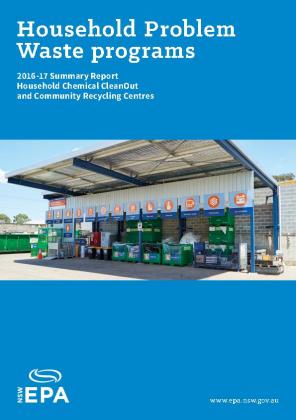To better protect our environment and the health of the community, the EPA is funding new and enhanced CRCs across NSW. Local councils and other organisations operate these centres in partnership with the EPA. Funding for the centres comes from the waste levy, as part of Waste Less, Recycle More.
Where are CRCs located?
There are now more than 90 CRCs open in NSW.
Search for your nearest CRCWhat can I take to a CRC?
- Only household quantities of these materials will be accepted. As a guide, this is a maximum container of 20 litres or 20 kilograms for each waste type.
- Some centres may accept other types of waste. Contact your local centre to find out if other items are accepted and if any charges apply.
- Handle and transport your items carefully. Protect your vehicle by placing items on a protective sheet or tray in the boot to capture any leakages or breakages.
What about household chemicals?
You can take household chemicals to a Household Chemical CleanOut event. This mobile collection service helps you safely dispose of a range of household chemical products, including household cleaners, pool and hobby chemicals and pesticides. CleanOut events are held at various locations in NSW on specified dates throughout the year.
Who can use CRCs?
Most Community Recycling Centres are open to all NSW residents. With the exception of Leichhardt and Cumberland, you do not have to be a local resident to use a centre. Community Recycling Centres complement the Household Chemical CleanOut program.
Business waste
Businesses are not eligible to use Community Recycling Centres and should contact a waste disposal service directly or visit BusinessRecycling.
Why should I use these centres?
Most of the items accepted at Community Recycling Centres can be reused or recycled. Sorting waste and taking it to a recycling centre
- helps improve recycling rates
- saves water, energy and other valuable natural resources
What happens to waste items after they have been dropped off?
- Paints are mixed with other waste solvents and used as an alternative to fuel in cement kilns. The metal containers are recycled.
- Lead acid batteries are sent to recyclers where the lead, acid and plastic are recovered and recycled.
- Fluorescent tubes and globes contain mercury. Recyclers crush the tubes to separate the phosphor powder from the glass. They feed the powder through receiving containers, where it is filtered to capture fugitive mercury emissions. The mercury is then separated by distillation and sold for a range of industrial uses. The metals are also recycled.
- Gas bottles have residual gas captured for reuse. Undamaged bottles are retested, restamped and entered into the hire industry. Damaged bottles are punctured and recycled as scrap metal.
- Used oils are processed to become a lubricant or used for waste to energy.
Other recycling services
Check RecyclingNearYou to find out where you can take other recyclable items that aren’t collected by your local council kerbside collection service.


